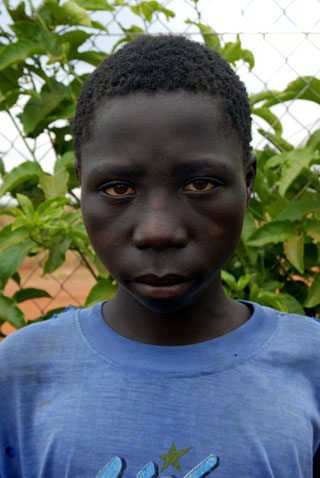Uganda: Children & War
by Lucy Yau
Currently on view at El Museo in Allentown is the work of social documentary photographer Errol Daniels.

Influenced by the photographers such as Milton Rogovin, Amy Arbus, and John Goodman, Daniels’ most recent project was inspired by Stephen Shames, another documentary photographer.
Daniels has in the past photographed the Civil Rights movement in Chicago. He is attracted, he says, to those subjects challenged by “physical, mental, social, or political disadvantages.”
Since 2006 he has been photographing with the children of Uganda, many of whom are orphans displaced by the conflict in the country’s northern regions. For the last three years he has been traveling to a camp in the Pader District of Uganda and documenting the lives of the children he meets.
After the dictatorship of Idi Amin and the loss of 300,000 lives, Uganda was thrown into chaos. What began as a power struggle in the mid 1980s has led to a 22-year civil war. As a result of the ongoing strife between the government in power led by Yoweri Museveni and a rebel faction called the Lord’s Resistance Army (LRA) led by Joseph Kony, approximately 1.9 million Ugandans are refugees within their own country.
Because northern Ugandans have not crossed an international border into another country, they are not considered refugees by the world community. Rather, the technical term they are referred to as are internally displaced persons (IDPs).
Kony’s reign of terror has included pillaging villages, abduction of children, and forcing boys to become child soldiers and girls to become sex slaves. Many of the children Daniels has photographed fled for their lives while their villages were ransacked and witnessed the murder of their parents, some of whom were hacked to death with machetes. An AIDS epidemic in the region has also decimated the adult population, leading to more orphans.
Museveni to maintain a semblance of safety has ordered that villagers relocate to camps overseen by his military so that they might mount offensives against the LRA, thereby increasing the IDP population.
The exhibit consists of 15 20-by-30-inch photographic portraits Daniels has taken of the children and a video presentation of drawings they did to explain what occurred to them and how they came to Pader camp. Unfortunately, the space was not large enough to allow the display of the original drawings.
The viewer meets remarkable children such as Laker Doreen, who was abducted from her village by rebels. Her mother was killed by members of the LRA while tending to the family vegetable garden. Doreen was pressed into manual labor by the LRA until she escaped one day to Pader after being warned that she would likely be traded to the Sudanese in exchange for arms. Another child is Ojok Benson, an orphan living in Pader camp with his brother. Their father was also murdered by the LRA and their mother died of liver disease.
Working with Stephen Shames’ nonprofit organization, Daniels has paid out of pocket for his own travel and expenses to document these children. They have been raising money to fund the education of the children in these IDP camps.
What drew Daniels to these children were their remarkable personalities and their ability to persevere despite the traumas they’d undergone.
The international community has made little outcry over the ongoing human rights violations. Daniels wants to raise awareness of the plight of the children. He says, “These children are not looking for handouts. They’re bright, they’re motivated. They want to go to school. These children are just amazing. They’re polite. The girls curtsy. They’re lining up to get an education and be successful.”
The exhibit is on view at El Museo (97 Allen Street, 884-9693) until October 18. For more information about the children of Uganda, visit leaduganda.org.
—lucy yau
blog comments powered by Disqus|
Issue Navigation> Issue Index > v7n39: The Sphere (9/25/08) > Uganda: Children & War This Week's Issue • Artvoice Daily • Artvoice TV • Events Calendar • Classifieds |









 Current Issue
Current Issue